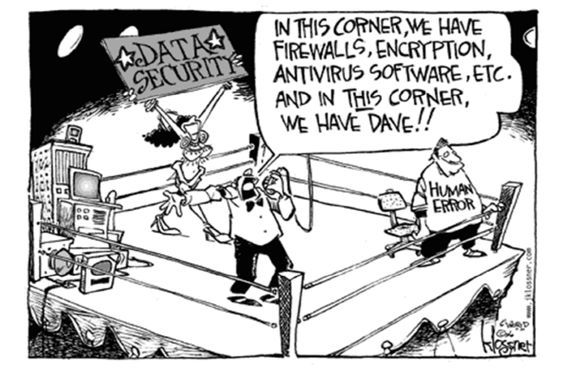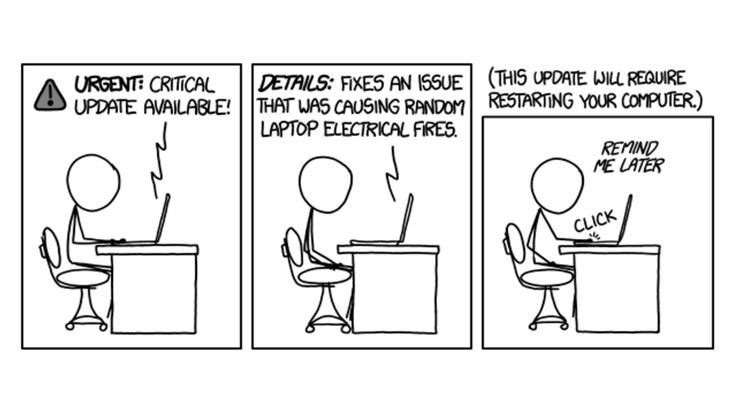Everyday, we go through our daily routines. Our busy lives, for the most part, start the same way at wake-up time

Source: http://oversitesentry.com/category/cyberjokesfriday/
and end the same way when we hit the covers. But each cyber-attack and data breach is a cautionary tale and a cry for change in our daily habits.
Today, I read an article titled, “What it will take for cybersecurity to become common sense” by Alfred Ng. It highlighted a point that has been my mantra through this whole project: Cybersecurity needs to become second nature, or as Ng writes, “common sense.” Just like we brush our teeth twice a day, look both ways before crossing the street, and put our seatbelts on while riding the car, knowing and managing the risks that threaten our personal information (PI) should never be an afterthought.
Human Error 101
Take this quiz: http://www.pewinternet.org/quiz/cybersecurity-knowledge/
What did you get?
Here’s a striking note: the article described a Pew Research Center survey in March 2017 of more than 1,000 American adults on their cybersecurity knowledge. “The survey asked what’s two-factor authentication, what is a virtual private network and how secure is public Wi-Fi. On average, people only answered five out of the 13 questions correctly. Only 1 percent of respondents got every question right.”
The article couldn’t have conveyed my message any clearer. CNET presented all the right evidence proving that as cyber-attacks are becoming more prevalent and dangerous, a large percent of the population continues to practice unsafe digital habits (even the most basic healthy practices!).
There are still thousands of people who think “password” is a good idea for a password. In 2016, Keeper Security looked at 10 million passwords stolen in data breaches, and 1.7 million of them were “123456.”
It is just these kinds of habits that results in attacks like WannaCry. The article explains how even though Microsoft released a patch for the particular exploit in March, “hospitals, banks, universities, and airports in 150 countries” were hit in May. This means that victims did not update their software, even after the warning from Microsoft.
Just like this, the article featured words of Michael Kaiser, executive director of the National Cyber Security Alliance, in saying that he sees an uphill battle for getting people mindful about their cybersecurity. Ng continues on to parallel this looming issue to how it took decades for doctors to accept that smoking was harmful.
Why is it so hard?
When we brush our teeth or our hair, it’s the same process everyday. It’s simple and the process wouldn’t change no matter the brush you have or the day you brush.
In dealing with cybersecurity, the article presents reasons why it is much more of a daunting task. They describe how there are just too many different kinds of devices and too many changes in technology happening for the user to account for. We find it hard to take control on all the systems we use, because in a day, we use so many.
However, they also revealed that researchers are working to ensure that safety online is “as simple as clicking a seat belt.”

Source: Oversite Entry, http://oversitesentry.com/category/cyberjokesfriday/
Looking Forward
Finally, here was my favorite part of the article:
The hope is that by the next generation, children growing up today will have better access to information on online safety as digital natives, and pass on the knowledge as common sense.
This makes sense! If we make good digital habits just as valued as good health habits, we can greatly decrease the amount of cyber-attacks caused by human error. Starting early is key. Fundamentals of password discipline, social media privacy, public WiFi safety, and malware detection should be reinforced whenever the child uses the Internet, so that every time they power on, they immediately think about safety measures. The more we start the talk about security and online safety, the more proactive we can be towards safeguarding the boundless amounts of data (personal data) in the future.
For more information, please read this article found on CNET: What it will take for cybersecurity to become common sense
Join me as we keep learning digital skills to keep you, your kids, and your students safe online. As we read today, this problem needs attention. Bits N’ Bytes is excited to be making change.
Thanks for reading! As always, stay safe and use your sharpest skills when surfing the web.
Sincerely,
Detective Safety


